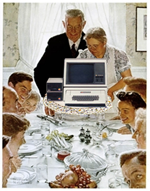This has been an unusually eventful week in the tech world. Let’s see, we’ve had…
HP’s rumored termination of its Windows 7 slate
Microsoft’s confirmed termination of its Courtier concept tablet
Apple’s announcement of its WWDC event (and specifically the lack of awards for Mac apps)
Blogger Charlie Stross does a remarkable job of tying everything together in this post–which says that Jobs’ aversion to Flash is really about Apple, and the rest of the computer industry, facing a life-or-death struggle over the next few years as PCs get even more commoditized and even more of our digital lives move online. Apple, Stross says, is trying to reinvent itself from a manufacturer of Macs into a gatekeeper and provider of services, and it’s trying to do it while it still has time.
One striking, subtle point about Jobs’s memo: He says “Flash was created during the PC era…” In other words, he’s saying we’re no longer in the PC era. Stross says that “the PC revolution is almost coming to an end,” which seems like as good a way to describe where we are as any.
You can quibble with bits and pieces of Stross’s overarching analysis–or the whole damn thing if you want–but it’s incredibly thought provoking. Having grown up in Boston in the 1980s, where Route 128 was lined with wildly successful minicomputer companies which no longer exist, I’m certainly not discounting the possibility that PCs will cease to exist sooner than we expect, and that none of the huge companies that make them is guaranteed an afterlife.

 Apple announced
Apple announced  I promise we’ll stop commemorating the
I promise we’ll stop commemorating the  Over on Twitter (where I’m
Over on Twitter (where I’m 
 Back in the early 1980s, it wasn’t a given that a family needed a home computer–or even that they knew exactly what a home computer was. So ads for PCs and related products made sure to show happy families–sometimes eerily happy families–crowded around the computer, enjoying the heck out of their purchase.
Back in the early 1980s, it wasn’t a given that a family needed a home computer–or even that they knew exactly what a home computer was. So ads for PCs and related products made sure to show happy families–sometimes eerily happy families–crowded around the computer, enjoying the heck out of their purchase.
